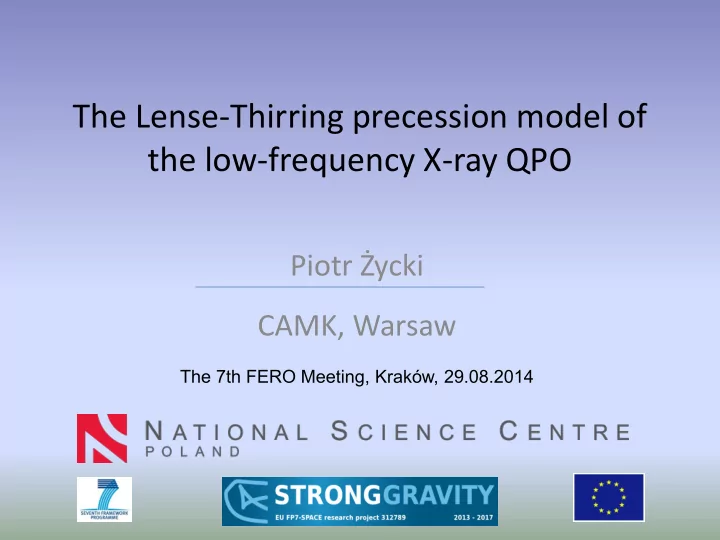

The Lense-Thirring precession model of the low-frequency X-ray QPO Piotr Życki CAMK, Warsaw The 7th FERO Meeting, Kraków, 29.08.2014
Important observational hint Higher inclination sources have stronger QPO (Motta et al., 2014; Heil, Uttley & Klein-Wolt 2014)
The Lense-Thirring precession model for low- f QPO Formulated by Stella & Vietri (1998) Recent hydrodynamical simulations suggest that the hot flow behaves (precesses) like a solid body. Inner radius of the flow is determined by properties of the bending waves. It is approximately independent of the spin of the black hole. As a result the maximum precession frequency does not depend on the spin) (C. Done, A. Ingram, C. Fragile)
Precession frequency LT frequency vs radius of LT frequency vs outer radius of precessing particle precessing solid body torus with inner radius set by bending waves The LT precession is of relativistic origin (requires Kerr metric) but we want to get rid of the dependence on a.
Precession axis
Geometry Two geometrical scenarios: 1.precession axis perp. to the outer disk 2.Precession axis inclined to the outer disk (based on Bardeen- Peterson effect)
Geometry 1 3D geometry does NOT change with the precession phase
Geometry 2: Position (azimuthal) angle of the precession axis is an additional parameter
Geometry 2:
Soft photons geometrically thick torus; to be compared with the blue curve coplanar config. prec. axis perp. to the outer disk prec. axis inclined to the outer disk
Results Precesion scenario 1 (precession axis perpendicular to the outer disk axis)
Precesion scenario 2 (precession axis inclined to the outer disk axis) precession axis towards the observer
Precesion scenario 2 (precession axis inclined to the outer disk axis) precession axis away from the observer
Timing properties of the QPO Time lags between two energy bands (1 vs 10 keV)
Future Add Fe line When the QPO is created by the modulation of the geometry, the line changes and produces a signal in the QPO spectrum
Possible developements: Model: 1. Illumination of the outer disk 2. Modification of the geometry: additional corona above the outer disk 3. Relativistic effects: not easy, since emission comes from a geometrically thick torus; even more difficult to introduce rel. effects inside the torus 4. Simulations of the timing properties of the QPO Visualization: Precessing torus Data: More data, systematic studies of QPO behaviour
Recommend
More recommend